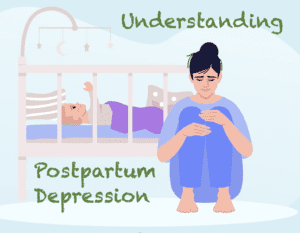Understanding Postpartum in the workplace
What is Postpartum?
Definition: postpartum is correlated with the mother’s condition after birth, whereas postnatal relates to the baby
The birth of a baby can provoke a mix of powerful emotions, from excitement and joy to fear and anxiety. Baby blues will typically begin within the first two to three days after delivery and may last for up to two weeks. It can also result in something you might not expect – Postpartum depression.
It can affect 10 to 15 in every 100 women after childbirth. The symptoms are similar to those in depression – low mood, poor sleep, lack of energy, lack of appetite and negative thoughts, and it can go on for more than 2 weeks. It can vary from mild to very severe.
Postpartum depression isn’t a character flaw or a weakness. Sometimes it can simply be a complication of giving birth. If you have postpartum depression, prompt treatment can help you manage your symptoms and help you bond with your baby.
New fathers can also experience postpartum depression. They may also feel sad or fatigued, be overwhelmed, experience anxiety, or have changes in their usual eating and sleeping patterns. They can experience similar symptoms that mothers with postpartum depression experience.
But for some new parents they may experience a more severe, long-lasting form of postpartum depression. Rarely, an extreme mood disorder called postpartum psychosis.
Postpartum psychosis or puerperal psychosis is a severe mental illness. It can start suddenly in the days, or weeks, after having a baby. Symptoms vary and can change very quickly.
They can include:
- feeling ‘high’, ‘manic’ or ‘on top of the world’.
- low mood and tearfulness.
- anxiety or irritability.
- rapid changes in mood.
- severe confusion.
- being restless and agitated.
- racing thoughts
- behaviour that is out of character.
- being more talkative and sociable than usual.
- being very withdrawn and not talking to people.
- finding it hard to sleep, or not wanting to sleep.
- losing your inhibitions.
- feeling paranoid, suspicious, fearful.
- feeling as if you’re in a dream world.
- delusions: odd thoughts or beliefs that are unlikely to be true
- hallucinations
If you have symptoms that suggest you may have postpartum psychosis, get help immediately.
What can the employer do to help?
Early intervention is key in helping in helping recovery. Assuring confidentiality, being approachable, and being mindful of an employee’s circumstances is pivotal.
- know what to look for
- monitor their behaviour
- keep communication open
- provide support
- educate managers on the subject
- create a self-care guide
- make sure employees know their rights
- offer professional support
- cultivate your culture
The common types of treatment for postpartum depression are:
Therapy
During therapy, you talk to a therapist, psychologist, or social worker to learn strategies to change how depression makes you think, feel, and act.
Medicine
There are different types of medicines for postpartum depression. All of them must be prescribed by your doctor or nurse. The most common type is antidepressants. Antidepressants can help relieve symptoms of depression and some can be taken while you’re breastfeeding. Antidepressants can sometimes take several weeks to start working.
Electroconvulsive therapy (ECT)
This can be used in extreme cases to treat postpartum depression.
These treatments can be used alone or together. Talk with your doctor or nurse about the benefits and risks of taking medicine to treat depression when you are pregnant or breastfeeding.
Having depression can affect your baby. Getting treatment is important for you and your baby.
For further information and help –
https://www.mentalhealth.org.uk/a-to-z/p/postnatal-depression
https://www.nhs.uk/mental-health/conditions/post-natal-depression/treatment/


